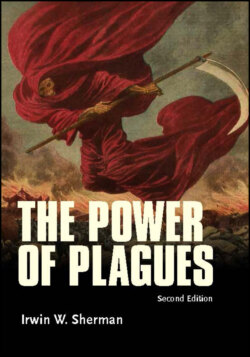Читать книгу The Power of Plagues - Irwin W. Sherman - Страница 37
Discrimination
ОглавлениеRestrictions such as cordons sanitaires and quarantine frequently were expanded to limit personal freedom, and to identify the culprits. The medieval public wanted to know who was to blame. They found in their community likely sources—strangers, lepers, beggars, the poor, prostitutes, and the Jews. Plague aided in the spread of anti-Semitism, a practice already begun when Jews were slaughtered beginning with the First Crusade in 1096. In some Muslim countries it was the Christians who were blamed; in both Christian and Muslim countries, however, the Jews were blamed. Although Jews, as the largest cultural minority, had been free to practice their religion by both Roman and canon law, once plague claimed the lives of the political leaders of a town, such freedom was soon abrogated. Early in 1348 the rumor arose that Jews were spreading the disease by poisoning the Christian wells. Though this appeared absurd to the kings and popes, and Pope Clement VI of Avignon (France) tried to discredit the charge by issuing a bull calling the accusations “unthinkable,” Jews continued to be blamed and persecuted. By the fall of 1348 formal accusations were brought against Jews, and when court officials extracted confessions, the rumors began to be believed. “Well poisoning” by Jews spread from Avignon to Strasbourg and then to all of Germany and Poland. Riots occurred in Strasbourg, and when the members of the local government tried to protect the Jews, they were thrown out of office. With a new government in place, more than 900 Jews, about half the entire community, were rounded up, and on February 14, 1349, they were burned on the grounds of the Jewish cemetery. At Freiburg all Jews were placed in a large wooden building and burned to death. In northern Italy legislation was enacted to identify the suspect groups—they chose a color, yellow—and Jews were required to wear a yellow Star of David on their clothing; prostitutes were also forced to have yellow labels. (It is ironic that yellow was traditionally used to identify lepers and criminals.) And because Jews were prohibited from owning land, they had become merchants, bankers, financiers, moneylenders, and pawnbrokers. Although they had the knowledge for mercantile trade, they were still discriminated against, especially in Germany and France. Killing of the Jewish moneylenders and bankers had another benefit—no loans to repay. The king of Poland, Casimir, had a Jewish mistress and needed the expertise of the Jews, and so they were invited to settle in Poland; as a consequence, in western Russia and Poland, Jews became a significant part of the population after the Black Death. (Their numbers would once again be reduced 3 centuries later by pogroms and gas chambers, latter-day instruments of anti-Semitism).
